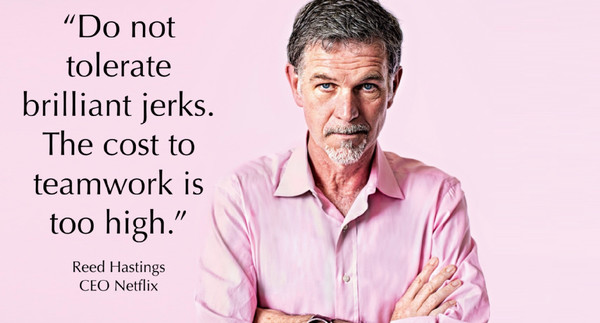
High Performing Jerks = Culture Crushers!
We've all worked with them... people who achieve outstanding results, but leave a trail of destruction behind them in the process! While their 'results' (typically financial) might bring short-term gains, these individuals can cause a long-term world of pain culturally (and therefore, financially), which begs the question... why do we refuse to see the forest for the trees, and allow ourselves to be held to cultural ransom by high performing jerks? Ultimately, shouldn't 'how' you achieve be just as important as 'what' you achieve?
'You get what you measure'...
Part of the problem stems from the age-old conundrum: 'you get what you measure'... If you measure (and incentivise) a set of outcomes, the potential exists for individuals to focus all of their energy on those outcomes, to the exclusion of all other factors...
"Hit my sales target and receive a bonus? Yes!"
"Walk over my colleagues and burn & churn clients in the process? Yes!"
The good news? As a leader, this is typically something you can remedy, by designing an appropriate set of goals and measures that target the 'how' side of what you're asking your employee to achieve. Consider the sales/production/revenue targets, or the number of outbound calls the 'hard' measures, and the strength of relationships (possibly NPS), demonstrated collaboration, and commitment to team success throughout the process, the 'soft' measures. These goals and measures can be more challenging to compose - they're not as straightforward as a set of numbers - but stick to the SMART principles, and design something specific that is meaningful to your employee. Better yet, use the soft measures as a gate-opener to the hard measures:
"if you don't play nice, you won't be rewarded financially, regardless of your sales figures"
Of course, this doesn't just apply to our friends in Sales roles; that's just an easy example to break down. Perhaps your employee is tasked with designing a new system/process, and implementing it across the business. The end product might be satisfactory, even exemplary, but if they don't engage key stakeholders appropriately, don't influence end-users to embrace the change, or they alienate their own team members by holding tightly onto every detail, then they have failed on the 'how'.
The 'Protected Species'...
Another common issue is the case of the 'protected species'; the employee who has connections in all the right places (generally Senior Management, or the Board), and continues on their destructive path, virtually untouchable. The impact here is twofold: first, you have the employees in their immediate vicinity, who become disgruntled and disengaged by the way they behave - perhaps you lose some top talent, who just aren't prepared to sit around in that environment; and second, you validate the behaviour and reinforce it as part of your culture. The longer poor behaviour has been tolerated, the more embedded it has become in the culture, and the more difficult it is to eliminate - and the more top talent you will continue to haemorrhage. Remember, regardless of an individual's contribution, if you overlook the 'how' and celebrate only the 'what', you are just perpetuating an unhealthy cycle!
Overall, the business world has matured (yes, some industries more so than others), and organisations understand that how you treat people (both customers and colleagues) is just as important, if not more so, than the financial results you achieve. Ultimately though, it is up to those who occupy leadership roles within an organisation to set the tone of the culture; to define what is 'above and/or below the line'. This requires leaders to display genuine leadership qualities, and to make it crystal clear (by example, and by follow-through as required) that:
"genuine collaboration and accountability for our own actions are non-negotiable if you plan on succeeding in this place".
Get this right, and you will set yourself up with a culture that delivers far greater and more consistent long term success than the short term spikes delivered by a Jerk!
What do you think?
Is 'how' you achieve just as important as 'what' you achieve?
Do leaders typically have the courage to call people on their behaviours?


Technical Team Lead
2yYup. I see this regularly... Why do they get a pass?
Representante Comercial
4yUau!!!
Entry Level Software Engineer (Per Scholas Alumni)
4yI like brilliant jerks also... to a point. My experience is brilliant jerks actually get the job done although they may need an occasional knocking down off of their high horse. My take is, let them loose but keep a tight reign. My experience too is that some companies need brilliant jerks. Especially in cases where supervisors and management are not hands on and let their employees, basically, make up their own rules and work environment.
State and federal government management - retired - having fun creating music as the ignorant savants® find me on Spotify, SoundCloud and BandCamp.
5yPreach!